#dr. michael greger
Text
Human milk has the lowest protein content ever in any species ever tested. I mean, that's the fluid that's been designed by evolution over millions of years. So, it's like the perfect food for human babies. Right? Perfect food. Lowest protein content [than] any other mammal. And so, it gives us a sense of our protein requirements more than anything.
- Dr. Michael Greger in What the Health
#q#quotes#dr. michael greger#what the health#documentary#true nourishment#protein#nutrition#mindful consumerism#mindful living#holistic leveling up#leveling up#mindfulness#protein requirements#frugivore#wfpb#whole food plant based#plant based lifestyle#food centric herbalism#self healing#that girl#green juice girl#vegan#human milk#human nutrition#wellness journey#sidewalkchemistry
44 notes
·
View notes
Text
Video: How to Cultivate a Healthy Gut Microbiome with Food
Food for gut health: Our gut flora is determined by what we eat, for good or for ill. An unhealthy intestinal biome is a major contributor to heart disease and other illnesses.
—
Michael Herschel Greger (b. 1972) is an American physician, author, and professional speaker on public health issues, best known for his advocacy of a whole-food, plant-based diet, and his opposition to animal-derived…
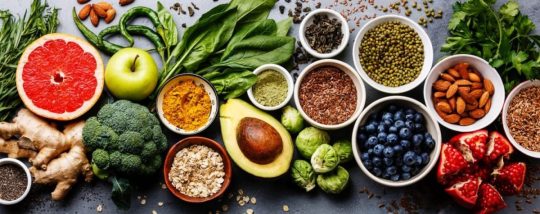
View On WordPress
#aging#Animal rights#Dr. Michael Greger#gut bacteria#How to Cultivate a Healthy Gut Microbiome with Food#Illness#intestinal biome#TMAO#vegan#Vegan Kitchen#vegetarian
1 note
·
View note
Text
if anyone uses the daily dozen here, i jus realized that miso soup counts as a serving of beans. literally the best news ive heard all week
4 notes
·
View notes
Text
Debunking Myths and Celebrating Benefits: The Truth About Oats
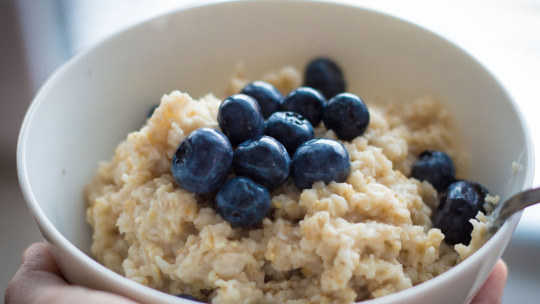
I'm own a mission to unravel the mysteries surrounding one of nature's most beloved grains: oats. Amidst the swirling sea of nutritional misinformation, one question often arises: do oats truly chelate nutrients and minerals, robbing us of their health benefits? Join me as we dispel myths, celebrate the virtues of oats, and unveil the undeniable evidence of their safety and efficacy in promoting heart health.
First, let's address the elephant in the room: the notion that oats chelate nutrients and minerals, hindering their absorption in the body. While it's true that oats contain compounds called phytates, which can bind to minerals such as iron and zinc, the extent to which they impact absorption is minimal. In fact, studies have shown that the overall nutritional benefits of oats far outweigh any potential drawbacks, making them a safe and nutritious addition to a balanced diet.
Now, let's turn our attention to the remarkable cardiovascular benefits of oats—a topic near and dear to my heart as a naturopath. You see, oats are not just humble grains—they're nutritional powerhouses packed with heart-healthy nutrients such as beta-glucan, soluble fiber, and antioxidants. These compounds work in harmony to reduce cholesterol levels, lower blood pressure, and promote overall cardiovascular wellness.
But don't just take my word for it—let's delve into the science. Numerous studies have demonstrated the cholesterol-lowering effects of oats, particularly due to their high content of beta-glucan—a type of soluble fiber that forms a gel-like substance in the digestive tract, trapping cholesterol and carrying it out of the body. By incorporating oats into your daily diet, you can significantly reduce LDL cholesterol levels, thereby lowering your risk of heart disease and stroke.
But the benefits of oats extend far beyond cardiovascular health. From stabilizing blood sugar levels and promoting digestive health to boosting immunity and supporting weight management, oats are truly a nutritional powerhouse with a myriad of health-promoting properties. Whether enjoyed as a comforting bowl of oatmeal, blended into smoothies, or baked into wholesome treats, oats offer endless possibilities for nourishing both body and soul.
Let's celebrate the humble oat for the nutritional treasure that it is. Let's banish myths, embrace evidence-based science, and savor the delicious and healthful bounty of oats in all its forms. Whether you're seeking to reduce cholesterol, support heart health, or simply nourish your body with wholesome goodness, oats are here to fuel your journey towards optimal wellness. Check out this video for more information about oatmeal.
#nutrition#naturopathy#restoration wellness#healthy lifestyle#health and wellness#Dr Michael Greger#oats#benefits of oats#oats and heart disease#wellness
1 note
·
View note
Text
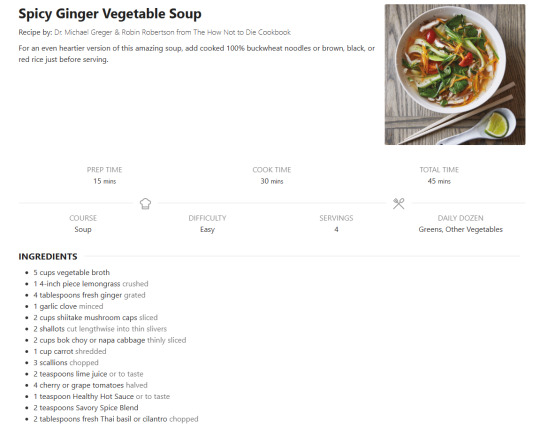
Spicy Ginger Vegetable Soup Recipe (nutritionfacts.org)
#plant based eating#vegan diet#spice ginger vegetable soup#soups and stews#how not to die cookbook#dr michael greger#eating healthy#stuff to try#singer#spicy#cabbage#scallions#lime juice#grape tomatoes#thai basil#lemongrass#vegetable broth#garlic#shallots#soba noodles
0 notes
Text
Plant-Based Benefits and Tips!
A couple of lovely people asked for some elaboration on plant-based eating! I studied nutrition & dietetics in college before I dropped out so I'm not a professional in nutrition but I do have a broad understanding of the biochemistry behind what we eat.
This is kind of a long post, so continue under the cut!
Starting with the basics!
I aim for a more whole foods plant-based diet, which is essentially a low-fat diet that focuses on removing all animal products, limiting processed food, and minimizing oils.
Looking at micronutrients, both protein and carbs have about 4 calories per gram, but oil has 9 calories per gram. Low-fat diets are often easier to manage calories on, as you can fill up on a higher volume of protein and carbs (specifically fiber) to reach satiety, whereas processed/high-fat foods are higher in calories per serving, meaning you get less volume.
You DO need fat in your diet, but it's preferable to reach for nuts, seeds, avocados, etc. instead of oil, which is comparatively nutritionally void.
FIBER IS YOUR BESTIE. Fruits, vegetables, and whole grains are low in calories meaning you can eat more of them, reaching satiety faster than you would with something processed. Fiber makes your digestive system happy. Be sure to incorporate more plants into your diet gradually so your digestive system can adjust.
Let's talk about animal products...
They are inflammatory by nature. If it comes from an animal, particularly red meat and ESPECIALLY processed meat, it will cause stomach issues in most people.
Fun fact, we are biologically closer to herbivores than carnivores. Our digestive tracts are much longer and our stomachs are less acidic than a carnivore's, meaning we are designed to most efficiently digest plant matter. Carnivores, on the other hand, have short digestive tracts and significantly more acidic stomachs for breaking down flesh and bone. This is why many people experience gastrointestinal discomfort when consuming meat. This leads to bloating, gas, and constipation. We are omnivores because we CAN consume animal products for survival, but it is nowhere near optimal.
Dairy is highly inflammatory and is directly linked to hormonal cancers (breast, prostate, etc.) It is also high in saturated fat, which is inflammatory. When we are born, we have the "gene" necessary to process breastmilk, but for many people, as we age, this "gene" gets switched off. Past infancy, we don't need milk (or other dairy products) because we can get our nutrients from other food sources. Black and Asian individuals have the highest rates of lactose intolerance. Not to mention, dairy is full of foreign bacteria, especially from factory farms, which causes an immune response in the body, leading to further inflammation.
Eggs are saturated fat and cholesterol bombs. They're high in protein, sure, but you can get protein and a wide variety of other nutrients from things like tofu.
To summarize, animal products are high in fat, high in cholesterol, high in calories, and cause inflammation, bloating, gas, and of course, constipation. Eating whole foods like vegetables, fruits, whole grains, beans/legumes, tofu, nuts, and seeds will boost your fiber intake, fill you with antioxidants, foster healthy gut bacteria, and reduce gastrointestinal issues.
Make sure you add more plants to your diet GRADUALLY. If you immediately go full force into eating plant-based, your stomach will experience distress due to the sudden increase in fiber, creating gas and bloating. But this will subside, and you'll feel better overall!
I highly recommend listening to seminars on YouTube by Dr. Neal Barnard, Dr. Michael Greger, Dr. Will Bulsiewicz, and Linda Davis RD to learn more in depth about what I've talked about.
Extra tips:
An air fryer is going to change your life when it comes to cooking without oil and making stuff taste good and have a better texture! I use mine multiple times a day.
TOFU!!! I'm a soy addicts, and tofu is my favorite source of protein. There's so many ways to prepare it, too!
Berries are so nutrient dense and delicious-- nature's candy!
There's honestly nothing wrong with protein powder even though it's processed. Just be sure to opt for vegan protein powder so you aren't loading your body with whey.
Stevia is a godlike sweetener, imo.
Eat a wide variety of different plants to diversify your gut microbiome and to get a variety of vitamins and minerals!
Take care of yourselves :') 💚🌿 I may add to this post as more things pop in my head!
When I tell you it's so goddamn easy to do dishes when you don't cook with oil 😭
Don't drink alcohol... this is the most hypocritical thing I can say lmao but it will wreak havoc on your gut microbiome
25 notes
·
View notes
Text

WATER IS LIFE~
"Your brain is almost 75% percent water. When you become dehydrated, your brain actually shrinks. Based on urine samples obtained from groups of nine to eleven-year-old kids in Los Angeles and Manhattan, nearly two-thirds of children may arrive at school in a state of mild dehydration, which may in turn negatively affect scholastic performance." Dr. Michael Greger
20 notes
·
View notes
Note
dr Greger says coffee has health benefits and if consumed in moderation It is health promoting
Michael Greger is another addict that could still learn a lot.
10 reasons to quit coffee:
The caffeine in coffee increases catecholamines, your stress hormones. The stress response elicits cortisol and increases insulin. Insulin increases inflammation and this makes you feel lousy.
Habituation to caffeine decreases insulin sensitivity, making it difficult for your cells to respond appropriately to blood sugar. High blood sugar levels lead to arterial deterioration and increased risk of mortality related to cardiovascular disease.
Unfiltered coffee has the highest amount of beneficial antioxidants yet also leaks the most diterpenes into your system. These diterpenes have been linked to higher levels of triglycerides, LDL and VLDL levels.
The helpful chlorogenic acids which may delay glucose absorption in the intestine have also been shown to increase homocysteine levels- an indicator for increased risk of cardiovascular disease which tends to be elevated in diabesity.
The acidity of coffee is associated with digestive discomfort, indigestion, heart burn, GERD and dysbiosis (imbalances in your gut flora).
Addiction is often an issue with coffee drinkers and makes it really difficult to rely on the body’s natural source of energy. Ask any coffee drinker about how it feels to withdraw from coffee, and you will mistake their story for that of a drug addict’s…
Associative addictions trend with coffee – who doesn’t immediately think of warm, frothy sweet cream and sugar when they picture coffee? Surely the business of coffee has inspired a culture addicted to the sugary, fatty tastes of what has become more of a meal then a drink! That morning latte is the epitome of food lacking nutrition density yet packing energy!
5-HIA, an organic acid and component of the neurotransmitter serotonin ( the happy chemical) seen in the urine tends to be elevated in coffee drinkers which means they may be at risk for lower levels of serotonin synthesis in the brain. Serotonin is necessary for normal sleep, bowel function, mood, and energy levels. It is a vicious cycle as caffeine can disrupt sleep and promote anxiety and depression. We all know someone who tends to be tired, wired and over caffeinated!
Elevated urinary excretion of important minerals such as calcium, magnesium and potassium have been noted in coffee drinkers. An imbalance in your electrolyte status can lead to serious systemic complications.
Constituents in coffee can interfere with normal drug metabolism and detoxification in the liver making it difficult to regulate the normal detoxification process in the liver. Another issue to be aware of with coffee intake is how certain medications such as levothyroxine (thyroid) as well as tricyclic antidepressants are poorly absorbed, making symptoms curiously worse for patients.
2 notes
·
View notes
Text
What You Need To Know About Nutrition
Published Jan. 20, 2023
We’ve all heard that we need to eat healthy. Our world is filled with diet culture and influencers promoting healthy teas, new restricting diets and fat blasting pills. But how do we know what to believe? Continue reading to learn some more about real nutrition facts and a healthy diet.
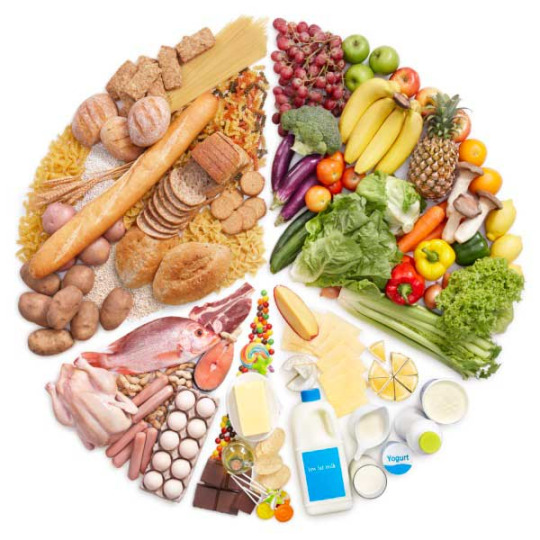
What is a Diet?
Before diving into the good stuff, we need to discuss what exactly a diet is. A diet is simply the culmination of all the foods that you eat in a given time period. It’s not just a restriction of the foods you are allowed to eat, it’s all of the food you eat, whether following a food program or not. Everyone has a diet, but not everyone has the same diet.
Benefits of a Healthy Diet
There are endless benefits to maintaining a balanced diet. Just like working out, our nutrition has effects on our bodies and minds. Healthy diets can increase your lifespan, boost your immunity, strengthen your bones, allow you to build muscles, lower your risk of acquiring many diseases and improve your digestion.
Oftentimes, we can avoid sickness by the foods we eat. There are many foods that obtain medicinal qualities that will prevent you from having to pay for medications down the road. Providing your body with nutritious food is a great way to support your immune system!
What You Should Eat
The U.S. Department of Agriculture has created an outline for what our plates should look like at each meal. These guidelines prescribe a daily intake of around 1-2 cups of fruit, 2-3 cups of vegetables, 6-10 ounces of grains and 5-7 ounces of protein. There is also space for extra food items as it is crucial that we enjoy the foods we are eating. Everything is okay in moderation.
As mentioned above, there are many food groups that we need to be eating from. A list of some healthy options for each of these groups is below.
Vegetables-
Broccoli
Cauliflower
Spinach
Kale
Green beans
Bell peppers
Carrots
Fruits-
Apples
Bananas
Oranges
Avocados
Berries: strawberries, blueberries, blackberries and raspberries
Pineapple
Grains-
Rice
Oats
Quinoa
Corn
Protein-
Chicken
Fish
Beef
Turkey
Eggs
Tofu
Greek yogurt
This list is not exhaustive; there are tons of other options out there that are more accessible to each region around the world.
How to Apply
Eating healthily can be overwhelming. There are tons of diet plans out there that restrict certain food groups and categorize them as “bad” foods. But the truth is, there are no bad foods. There are nutrient dense foods and not as nutrient dense foods and they are all good in moderation. Life is about enjoying things and if we restrict ourselves to only eating vegetables, we miss out on some awesome, flavorful foods. Finding what works best for you and your body is the most important thing.
Helpful Links
Below are some links to nutritional, science based podcasts to help you better understand how food affects your body.
2 notes
·
View notes
Text
youtube
Favorite Dr. Michael Greger - NutritionFacts.org Videos
Health Benefits of Non-Dutched Baking Cocoa Powder Without Sugar (Sweetened With a Healthy Alternative Sweetener), Without Milk… the Best of All Worlds. Chocolate and Artery Function: https://youtu.be/1-tfm9waeAE
#vegan #superfoods #chocolate #cocoa #cacao #MichaelGreger #NutritionFactsOrg
2 notes
·
View notes
Text
The only other vitamin [of concern] is vitamin B12. It's not made by plants. It's not made by animals either. It's made by little microbes that blanket the earth. Because of the way we live in our sanitized world, unless you're eating bacteria-contaminated foods, we need to get a source of vitamin B12 from somewhere. So, the healthiest, cheapest, safest source is to get a vitamin B12 fortified food or vitamin B12 supplement — not to get it from meat and dairy...There's no vitamin, mineral, nutrient that you can't get from non-animal sources.
- Dr. Michael Greger in What the Health
#q#quotes#dr. michael greger#what the health#documentary#nutrition#wfpb#whole food plant based#plant based lifestyle#mindful consumption#mindful living#mindfulness#ethical consumption#frugivore#vitamin b12#vegan#that girl#green juice girl#holistic leveling up#leveling up#wellness journey#fitblr#food centric herbalism#true nourishment#sidewalkchemistry
1 note
·
View note
Link
Check out this listing I just added to my Poshmark closet: How Not To Diet (by Michael Greger, MD, FACLM) 💯FREE SHIPPING💯.
0 notes
Note
what's the daily dozen?
It's a way of eating where you get a certain number of servings from a dozen different groups- beans, berries, other fruits, greens, cruciferous veggies, other veggies, nuts/seeds, flaxseeds, herbs / spices, whole grains. it's based on the book "how not to die" by dr. michael greger! anna akana made a video about it, which is how i found out abt this way of eating: https://m.youtube.com/watch?v=7lU7MlkNZuA
i've learned a lot about nutrition by eating like this, and i like it bc it's additive- i'm adding more servings of unprocessed food to my diet instead of banning certain foods. would recommend reading how not to die / watching anna's video
2 notes
·
View notes
Text
The Importance of Health Education and Nutrition Knowledge for Holistic Wellness
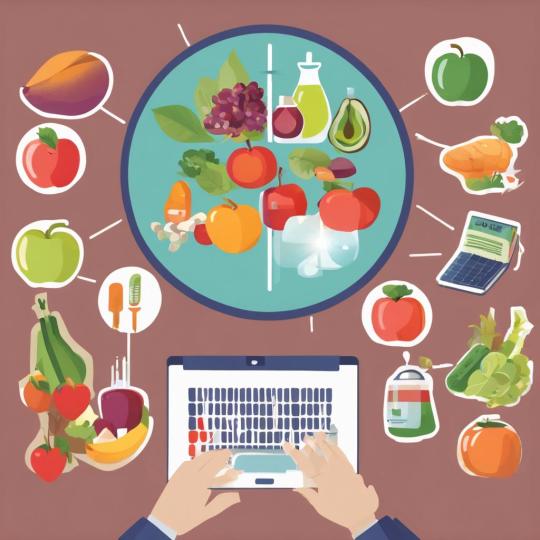
In today's fast-paced world, maintaining a healthy lifestyle has become more crucial than ever. While exercise and a balanced diet are undoubtedly essential, an often underrated aspect of overall well-being is health education and nutrition knowledge. Equipping oneself with a sound understanding of these subjects can help individuals make informed choices about their diets, lifestyle habits, and overall health. In this comprehensive guide, we will delve into the importance of health education, nutrition knowledge, and highlight some valuable wellness resources and dietary advice.
1. Why Health Education Matters:
Health education empowers individuals by providing them with the necessary knowledge and skills to make informed decisions regarding their health. It encompasses a wide range of topics, including nutrition, physical activity, disease prevention, and mental health. By promoting health literacy, health education fosters self-care, enabling individuals to take control of their well-being.
2. The Power of Nutrition Knowledge:
Nutrition knowledge extends far beyond simply understanding the nutritional content of different food items. It involves comprehending the impact of various nutrients on our body, the role of macro and micronutrients, and the importance of a well-balanced diet. With sound nutrition knowledge, individuals can make educated choices when it comes to meal planning, portion control, and specific dietary needs.
3. Wellness Resources for Health Education:
Fortunately, there are numerous resources available to help individuals enhance their health education and nutrition knowledge. These resources can be in the form of reputable websites, health blogs, online courses, and even health-focused podcasts. Some popular resources worth exploring include:
a) National Institutes of Health:
The NIH website offers a wealth of information on a broad range of health topics, making it an excellent resource for evidence-based research and education.
b) Harvard Medical School:
As a leading institution in medical research and education, Harvard Medical School's website provides valuable articles and resources on nutrition, healthy aging, and overall well-being.
c) NutritionFacts.org:
A non-profit organization founded by Dr. Michael Greger, this website offers comprehensive information on nutrition science, featuring videos and articles backed by scientific research.
d) MyFitnessPal:
This mobile app not only tracks nutrition and exercise but also provides access to a vast database of nutritional information, recipes, and healthy eating tips.
4. Dietary Advice for Optimal Health:
While nutrition knowledge is fundamental, it is also essential to gain practical dietary advice to implement in daily life. Consider incorporating the following tips into your routine for improved overall health:
a) Eat a Variety of Colorful Fruits and Vegetables:
Different fruits and vegetables offer a rich variety of vitamins, minerals, and antioxidants, promoting optimal health and reducing the risk of chronic diseases.
b) Choose Whole Grains over Refined Grains:
Whole grains provide more fiber, vitamins, and minerals than refined grains while helping maintain stable blood sugar levels and promoting gut health.
c) Include Adequate Protein Sources:
Protein is vital for muscle growth, repair, and overall body functions. Opt for lean protein sources such as poultry, fish, legumes, and tofu.
d) Stay Hydrated:
Proper hydration is essential for maintaining bodily functions, regulating body temperature, and supporting overall health. Aim for at least 8 cups of water per day.
Conclusion:
By acknowledging the importance of health education and nutrition knowledge, individuals can take transformative steps towards leading healthier lifestyles. By utilizing the available wellness resources and adhering to expert dietary advice, we can optimize our well-being and enhance our quality of life. Embracing a holistic approach that incorporates both physical and mental health is the key to unlocking our true potential.
Discover a new era of wellness with Puravive's Natural Weight Loss Supplement. Our carefully crafted formula supports your weight loss goals naturally and effectively. Harness the power of nature to achieve your dream body. Learn more on the Puravive Natural Weight Loss Supplement Product Page.
Read the full article
0 notes
Text
How Doctors Respond to Being Named the Third Leading Cause of Death
By: Dr. Michael Greger
November 4, 2016
In my video ‘Why Prevention Is Worth a Ton of Cure’, I profiled a paper that added up all the deaths caused by medical care in this country, including the hundred thousand deaths from medication side effects, all the deaths caused by errors, and so on. The author of the paper concluded that the third leading cause of death in America is the American…
View On WordPress
0 notes
Text
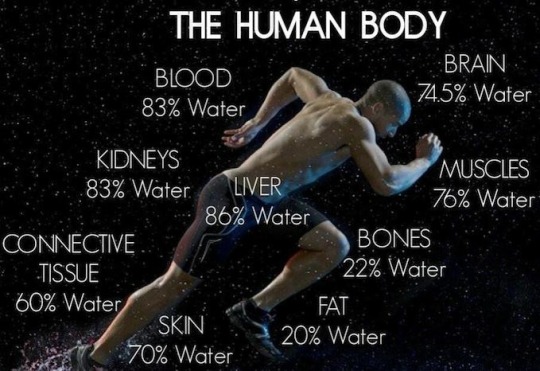
WATER IS LIFE!
"Your brain is almost 75% percent water. When you become dehydrated, your brain actually shrinks. Based on urine samples obtained from groups of nine to eleven-year-old kids in Los Angeles and Manhattan, nearly two-thirds of children may arrive at school in a state of mild dehydration, which may in turn negatively affect scholastic performance." Dr. Michael Greger
34 notes
·
View notes